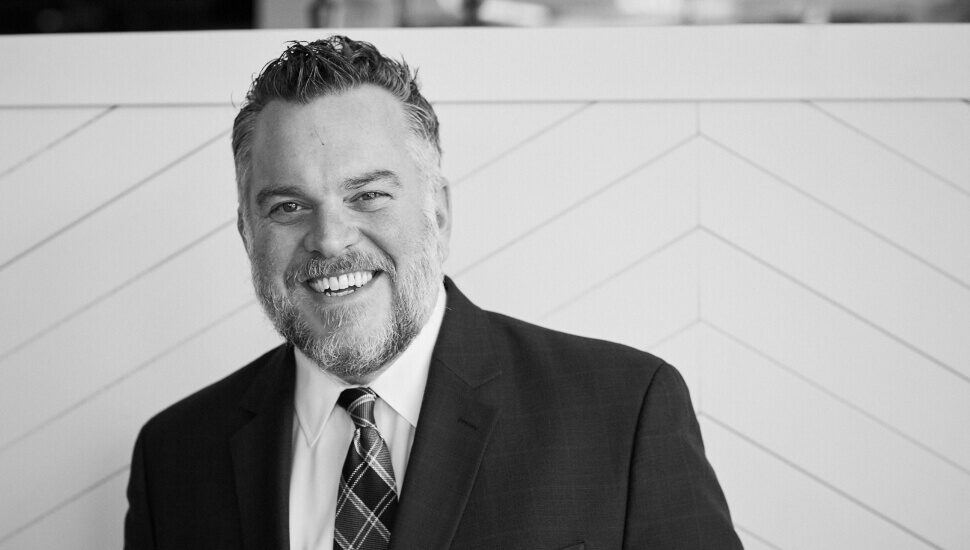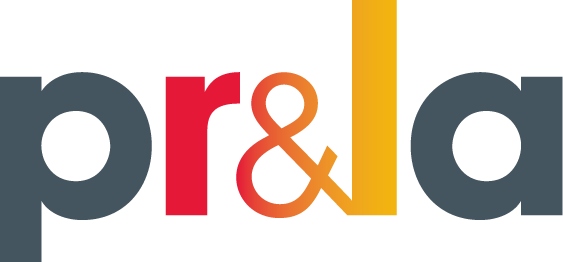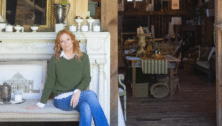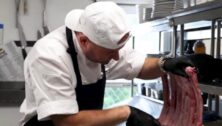Chester County Leadership: Ben Fileccia, SVP of Strategy and Engagement at the Pennsylvania Restaurant & Lodging Association


Ben Fileccia, Senior Vice President of Strategy and Engagement at the Pennsylvania Restaurant & Lodging Association, spoke with VISTA Today about the hospitality “gene” he got from his grandfather and brother and how he got his start in the restaurant industry after an unsuccessful business venture.
Fileccia also talked about the lessons he learned from working at top restaurants and with leading restaurateurs, including Marc Vetri, Jeff Benjamin, and Kevin Sbraga. And he discussed the challenges facing the hospitality industry and why workforce development is the number one priority going forward.
Where were you born, and where did you grow up, Ben?
I was born in Havertown in 1972, the youngest of five children. I have twin sisters five years older than me, a brother seven years older than me, and a sister eight years older than me.
What did your parents do for a living?
My mother worked as a nurse practitioner, and my father spent his whole career as a chemist for the Department of Defense at the Defense Personnel Support Center in South Philadelphia. But he started out in hospitality, too, ironically. In high school, he started working at Horn and Hardart’s at the automat. He won a full scholarship to the University of Pennsylvania from Horn & Hardart’s.
What memories do you have of growing up in Havertown?
I loved it growing up in Havertown. There were so many kids around. I remember leaving the house at 7:00 in the morning in the summer and going down to Karakung Swim Club and being on the swim team and being there all day, every day. I just had to be home five minutes after the streetlights came on at night.
There were so many kids, and we just had so much fun. We’d ride our bikes too far and spend days walking along Merwood Creek and Darby Creek. It was a great childhood; my brothers and sisters always took me under their wing.
Besides swimming, did you play any other sports?
Much to my father’s chagrin, I did not. I remember joining the Little League, and he became the coach. I lasted about three games, and he lasted the whole season.
I was much more of the creative type. I loved the sciences, the arts, and enjoyed many wonderful friendships.
What kind of jobs did you have as a kid?
I started working when I was 13. My first job was with Lawrence Park Swim Club for $3.35 an hour as their lawn boy.
When I entered high school, I started working for the Community Service Corps of the Archdiocese of Philadelphia in a leadership role. That experience allowed me to hone my interpersonal skills as well as love of public speaking.
What lessons did you take from those jobs that still guide your life?
My parents instilled the values of working hard and earning money to get what you want. They encouraged all of us to go to college, but they weren’t in a position to be able to pay for it, so we had to either work hard at school to get scholarships or work hard at jobs to pay for school. We also learned to treat everybody with respect.
After high school, I started working for Acme Markets while going to college. I only went to college for a couple of years and a couple of different colleges. That didn’t really stick. But hospitality and working with the public – I have that hospitality gene.
Where did you get that gene from?
I think I got that from my older brother and my grandfather. My grandfather on my mother’s side, Bill Nihill, worked for GE his entire life and was the most affable guy. My brother took after him, and I took after them.
What was your first restaurant job?
I moved from West Chester to Naples, Fla. with my brother in the early 90s. We would ship Via Veneto Water Ice from Norristown down to Naples. I set up stands on the beaches and in public markets, and my brother was selling it wholesale.
Eventually, I moved back home a few years later, and a friend of a friend hired me at the Steak & Ale, next to the old Valley Forge Music Fair in Berwyn. I started working there as a server. A few months later, one of the bartenders left, so I started bartending. At the end of the year, I became a dining room manager. I just loved it. It was such a natural fit for me.
What was it about it that you liked?
It was the immediate ability to create memories and fantastic moments for guests. I was able to recieve immediate feedback. I could change somebody’s whole day with just a simple act.
I eventually moved to Philadelphia and started working for an iconic restaurant. It’s now closed, but in 1999 I became the general manager of the Rose Tattoo Café, which was on 19th and Callowhill Street. At that time, when Zagat was still a thing, the Rose Tattoo was always in the top 20.
I honed my hospitality skills there. It was before OpenTable, before any of that technology, so I had a little black book and would never forget guests’ names, what they liked and didn’t like, what their wife’s name was, even what their dog’s name was. That little black book ended up elevating my career.
I left the Rose Tattoo after about 10 years and started working for a place that I did not know was about to go out of business. So I I found myself out of work for the first time since I was 13 and was very despondent. Two of my former servers had just opened up a restaurant with Marc Vetri called Osteria. I used to go in there, and as somebody collecting unemployment and was on limited finances, they would sometimes give me a free drink or pizza. This was going on for about four months, and finally, Marc Vetri came up to me and said, “You’re here all the time, don’t you work anymore?” I said, “I’m out of work.”
Marc Vetri’s business partner, Jeff Benjamin, called me the next day. He said, “We have a restaurant opening up in eight months, and we would like you to take the helm at that restaurant, but I don’t want you to go anywhere in the meantime, so I would like you to start here next week. I was in the Rose Tattoo once and met you. The second time I came in, I ordered a Diet Coke. You brought it out to me and didn’t put a lemon on it. I have a lemon allergy, and I never even told you that – all you saw was that the first time I came in, I had taken the lemon off. That’s the type of hospitality we are looking for.” I knew that because of my little black book.
I started working for them and thought I had hospitality down, but I soon realized I didn’t. I didn’t know elevated dining, and I didn’t know fine dining, so I had a lot to learn, but I was a very fast learner. When I opened Amis in 2009 on 13th and Pine Street in Philadelphia, that quickly became the hottest place in Philly.
I want to tell you this story to show you the level of hospitality I still expect from people and hope we can return to.
It was about three weeks in on a busy Saturday night. Jeff comes in and says, “Are the Moscowitzes here?” I said, “Yeah.” He said, “What table are they at?” I went to look at my OpenTable, and he said, “You shouldn’t have to look at the screen. There are only 82 tables in here. You should be able to tell me where they’re at.” I said, “I’m sorry. They’re at table 21.” A couple weeks later, he came in and said, “Are the Lories in?” I said, “Yes, they are; they’re on table 22.” He said, “What course are they on?” I said, “I don’t know.” He said, “That’s unacceptable. There are only 82 tables in here.” Next week, the same thing happened. Each time, I’m picking up more and more. I soon realized that as a GM, I had to be aware of everything that was happening in the restaurant at all times.
When I started designing restaurants myself, I always designed them so I could stand somewhere and see the entire dining room – every single glass of water.
You’ve mentioned a few people who opened up doors for you, but who else saw promise in you?
Marc Vetri, Jeff Benjamin – they were definitely mentors to me. When I left the Vetri group, a friend of mine, a chef by the name of Kevin Sbraga, opened his first restaurant in Philadelphia. He had just won “Top Chef” and although his food was amazing, his FOH team was poorly managed and service was not at the same level as it should be. Craig LaBan had just reviewed the restaurant and had given Sbraga a two-bell review, which means “very good.” Still, any respectable chef in Philadelphia knows that’s not very good.
Kevin called one of his investors, a fantastic hospitality attorney and consultant named Phil Colicchio. Phil said, “You need Ben Fileccia. Ben is the equivalent of a third bell for your restaurant. If you bring Ben in, it’s going to change.”
Was Phil’s assessment accurate?
Absolutely. I don’t want to sound arrogant, but that’s something I was built to do. It’s in my blood. Kevin is such an amazing chef but he needed a partner that would be able to elevate the experience in the dining room. By the end of the year, Esquire magazine named us the best new restaurant in America. Philly Magazine had us in the top 5 of the 50 best restaurants in Philadelphia. The following year, Philadelphia magazine named me “Best of Philly” for general manager. Investors took note, and we started opening up some other exciting restaurants.
Tell me about your role in Pennsylvania Restaurant & Lodging Association today.
The Pennsylvania Restaurant & Lodging Association has been around for a long time. We represent restaurants, hotels, events and caterers, amusements like Hershey Park and Dorney Park, golf courses: any business under the hospitality umbrella. We also represent the destination marketing organizations in the state. We provide resources, guidance, and government affairs work. I was a member of the PRLA when I was operating restaurants, and I realized the value they provide our industry.
About five years ago, I took a full-time role with them. It has been fantastic because, during my restaurant career, I always made it a point to help people out, either through direct mentorship or just by providing guidance. And if I couldn’t help them directly, I would find somebody that could help them. The PRLA created this position for me. It allows me to do what I used to do on the side, full-time.
So, the pandemic had a huge impact on the hospitality industry, and you’re coming out of that. Where would the PRLA like to see the industry head?
It will take some years for the restaurant and hospitality market to recover. We see hotels coming back to 2019 levels by 2023. As far as revenue for hotels, they’ll probably hit pre-pandemic revenue by this year, but that’s driven by room rates, not occupancy.
But restaurants are going to be struggling. I remember that when the Pope came to town, I had three restaurants in Philadelphia. One of them was right on Broad Street in the red zone where you couldn’t drive, so I decided to close the restaurant the weekend the Pope was in town. We lost $35,000 that weekend. And it took us over a year to recoup those losses. Now you multiply that by half of March of 2020, all of April 2020, half of May 2020, and then 70 percent reduced revenue for the next seven months and 50 percent for the next four months; these restaurants will be digging out for a while. Historically, restaurants work on a 2 to 7 percent profit margin, and that was before the costs of goods went up. So full recovery will be a challenge.
One of my primary focuses this year and in the coming years – and this is not a short term fix – is workforce development. The PRLA has the association, but we also have a foundation. The foundation, historically, has been set up to provide scholarships for folks interested in hospitality. There’s also our ProStart program, which is a secondary culinary education program that operates in 42 high schools in Pennsylvania. But that alone is not enough. Our foundation must grow to provide workforce development for not just next month, not just for the next year, but for years to come,
This industry has changed. It’s continuing to change. We have lost so many employees to other industries that we have to bring those employees back and build excitement about hospitality with the next generation and those who have left us. If we don’t have employees, we’re not going to have restaurants.
I get ads all week about robot servers and robot food runners. Well, as a hospitality professional, that is not hospitality to me. Genuine hospitality, to me, is that 1:1 interaction. Restaurants are where we celebrate our anniversaries and our birthdays and where we get engaged and where we celebrate life when somebody has passed. Restaurants bring people together and create neighborhoods and communites.
So, what do you do with all your free time, Ben?
My girlfriend and I love exploring Pennsylvania. During the pandemic, we would take weekend trips centered around small towns, whether it be the Poconos or further west or Lancaster. We love walking around small towns and seeing what Pennsylvania has to offer. And I still like going out to restaurants a lot and visiting my friends.
Do you read much?
Not as much as I used to. But I just finished reading “Heat 2.” It’s a prequel and sequel to the movie “Heat” that starred Al Pacino and Robert De Niro.
I also read a great book that has helped me manage my personal and business relationships. It’s called “Never Split the Difference” by Chris Voss. I’ve also been reading this book about smell, “Nose Dive” by Harold McGee It’s fascinating, but it’s a little cerebral.
In this crazy world that we live in, Ben, what gives you hope?
My motto is tattooed on my wrist. It says, “Be nice.” I’ve gotten a lot out of my life from just being nice. If I’m nice to people, it’s very hard for them not to be nice back.
What’s the best piece of advice anybody ever gave you, Ben?
I often think about something Danny Meyer wrote – he’s the restaurateur out of New York City. I’ve heard him say, “Treat people as if they were home even when you wish they were still home.”
Another thing – when I started working for Kevin Sbraga, Kevin came from a Ritz-Carlton background. Their golden rule at the Ritz-Carlton is, “We’re ladies and gentlemen serving ladies and gentlemen.”
When I started working with Kevin, I remember we had these terrible guests. Finally, they said something really insulting to one of our servers. Kevin jumped over the chef’s counter, went to the table, and said, “Get the f—out of my restaurant.”
Kevin and I talked at the end of the night, and he said, “You know the rule is, ‘We’re ladies and gentlemen serving ladies and gentlemen.'” I said, “I know – that’s why I didn’t think I should ask them to leave.” He said, “No – that rule goes two ways. We don’t have to serve them if they stop behaving as ladies and gentlemen.”
Because the staff saw how much their owner had their back and how protective he was, he immediately earned their loyalty and respect. It completely changed how I thought about guest interaction.
Connect With Your Community
Subscribe to stay informed!
"*" indicates required fields




![95000-1023_ACJ_BannerAd[1]](https://vista.today/wp-content/uploads/2023/03/95000-1023_ACJ_BannerAd1.jpg)











































